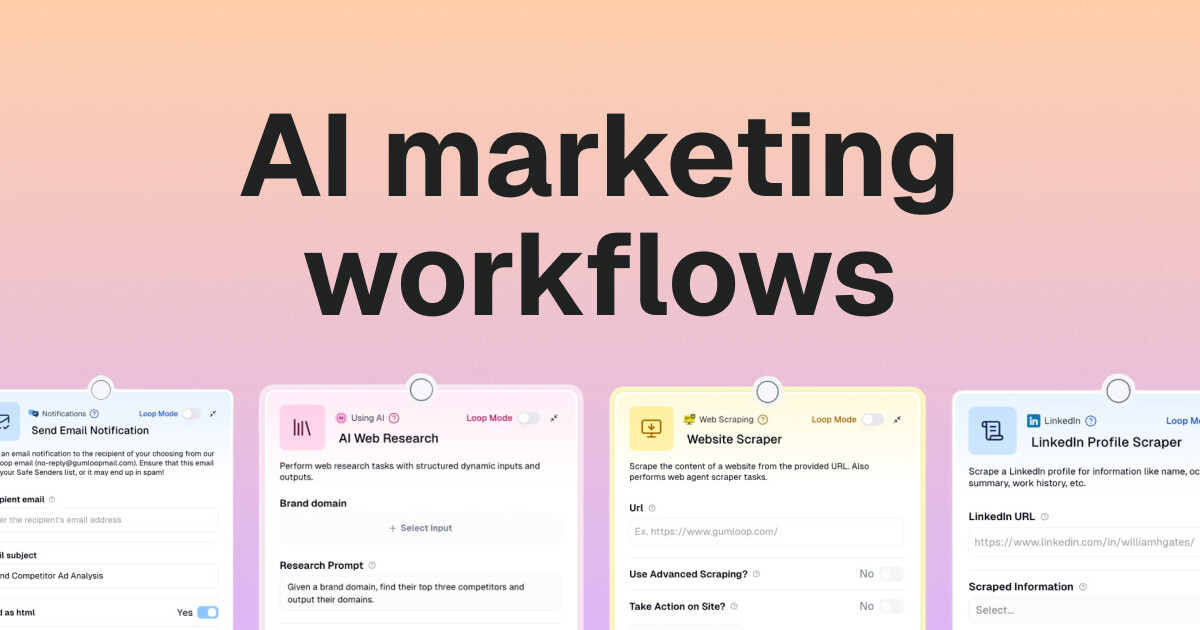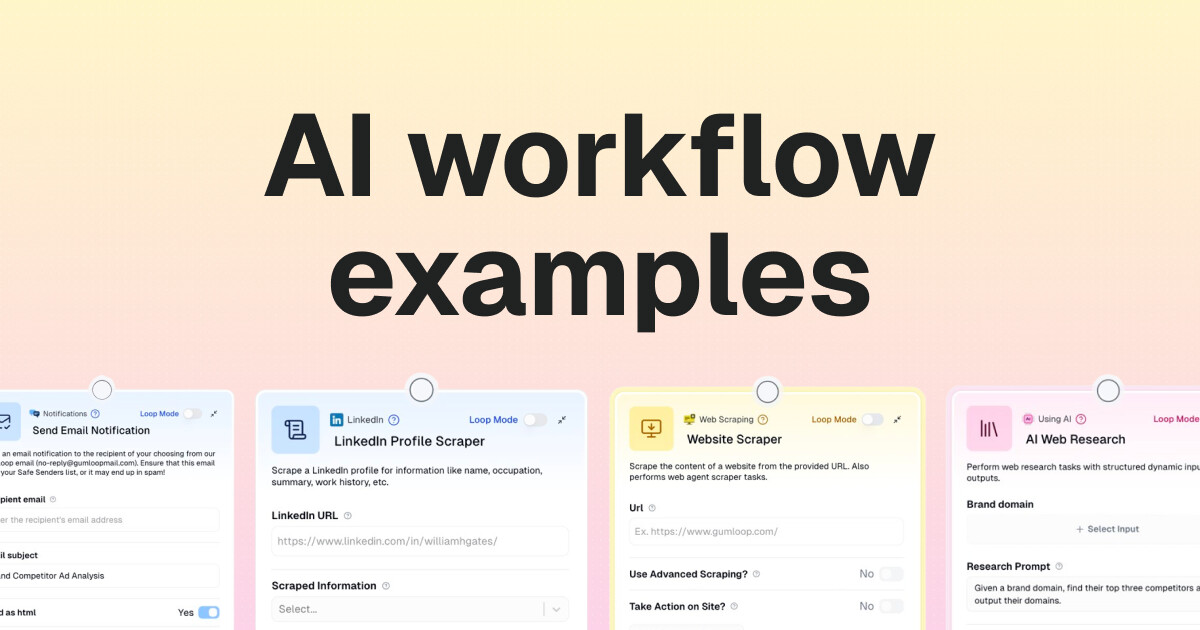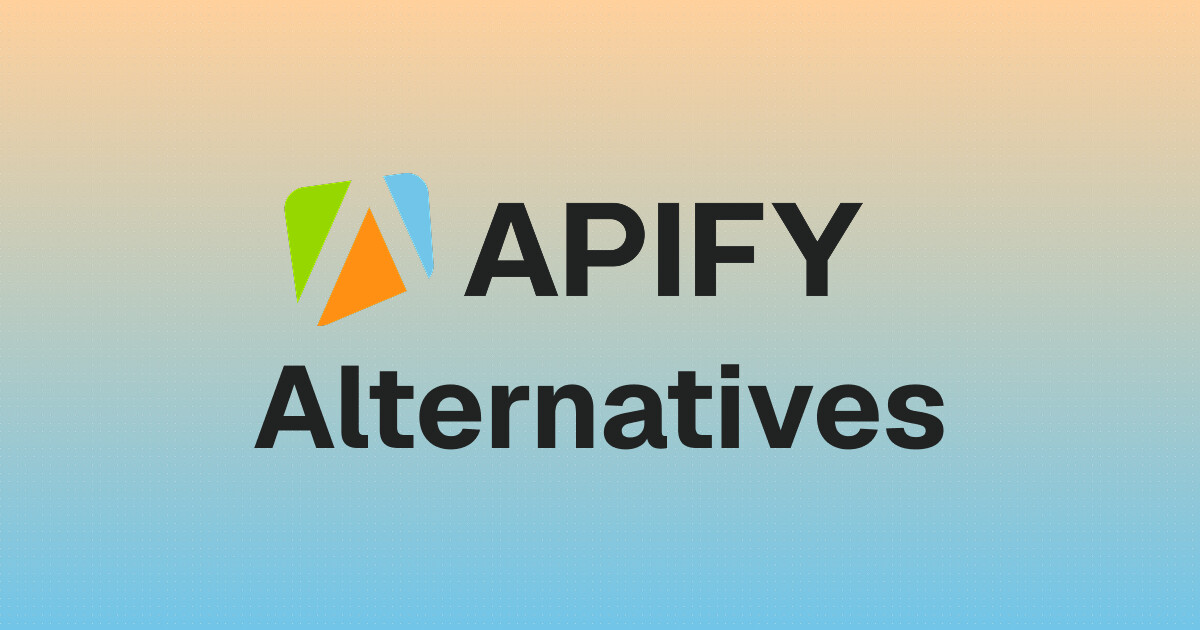10 best marketing automation platforms I’m using in 2026

I am obsessed with marketing. So much so that I run one of the biggest marketing blogs, and I'm constantly testing different marketing automation platforms and tools weekly.
What I have come to realize is that startups (of all sizes) have AI FOMO right now. They are all trying to adopt AI because they see some of the biggest organizations like Shopify, Webflow, Notion, and a ton more adopt these tools.
And they're not wrong to think this way.
In fact, marketing automation is here to stay. It always has been, for the better half of the past decade. It's just been rebranded now with the rise of LLMs and AI popularity.
Let's start with the basics and then dive into the platforms that are actually making a difference for businesses right now.
What is a marketing automation platform?
A marketing automation platform is a tool that helps you automate certain tasks within your marketing organization. These platforms have become a lot more popular since the rise of AI, as many companies are now trying to figure out how to leverage automated workflows to get more done with less headcount.
However, marketing is a super broad discipline, and this can encompass everything from running ads to sending emails to prospective clients to creating content to even just automating specific workflows within a task that you might do on a daily or weekly basis.
In fact, I have seen companies, especially in tech, begin to automate in areas such as:
Using AI to automate different workflows, using sales automation tools to help you with outreach efforts, automating your analytics and reporting, helping you with email marketing automation, and a ton more.
What to look for in a marketing automation platform
While I am going to give you my favorite marketing automation platforms below, I do want to explain first what you should look out for so you can make the right decision for yourself.
There are a ton of these tools out there, and there are a lot more than the 10 that I mentioned below, so let me first show you what you should be considering when you're trying to find a platform for yourself.
Here's what you should look out for when choosing a marketing automation platform:
- Caters to your use case: Not every marketing automation tool is built the same. Some are great for email marketing, others at social media scheduling, and some are built specifically for ecommerce. Before you start shopping around, figure out what you actually need to automate first.
- Shows you what to automate: The best platforms help you figure out what should be automated in the first place. Look for tools that have templates, suggestions, or guides that show you common workflows for your industry.
- Easy to use and understand: If you need to be an AI Engineer yo set up basic automations, you'rwebe using the wrong tool. The whole point is to save time, not spend weeks learning how to use the platform. Look for drag-and-drop builders and no-code tools with clear docs.
- Is secure and scalable: You're going to be connecting these tools to your customer data, email lists, and other sensitive information. Make sure the platform has proper security measures and can grow with your business.
- Provides real intrinsic value and not just perceived value: Some tools look impressive with fancy dashboards and lots of features, but they don't actually move the needle for your business. Great marketing, mid product. Focus on platforms that can clearly showcase ROI and help you achieve specific business outcomes, not just automate for the sake of automation.
With all that in mind, I have tested over 30 tools in the past 2 years, and I’ve narrowed it down to my top 10 favorites. These are tools I actually use myself or are used by my clients.
Alright, let’s get into it.
10 best marketing automation platforms in 2026
Here are the best marketing automation platforms:
Let’s go over each one in-depth.
1. Gumloop
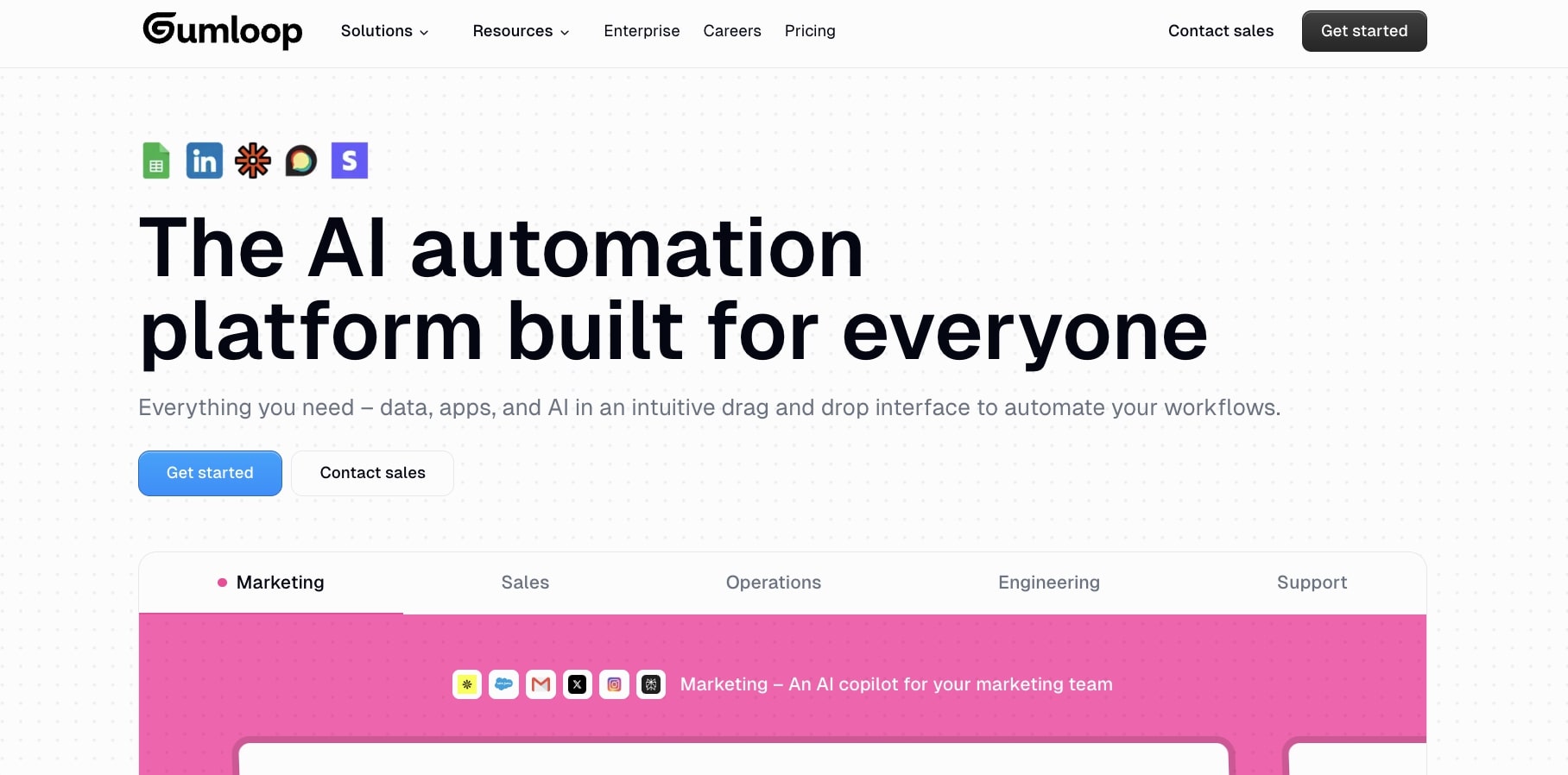
- Best for: Creating AI-powered automations without coding
- What I like: Beautiful user interface and can connect with any LLM
- Pricing: Generous free plan, then starts at $37 per month
Gumloop is an AI automation platform that is designed to help you automate any workflow within your marketing organization. It's a tool I've been personally using for over 9 months now and it's quickly become my favorite marketing automation tool of all time.
You can create these flows that connect with any tool that you may already be using. From there you can connect your tools to any LLM model like ChatGPT, Claude, Deepseek and more and create these powerful automated workflows that combine different tools with AI models.
The platform is designed to help you automate pretty much anything, so it can work for things outside of just marketing like sales, operations, finance, or even HR. But when it comes to specifically marketing, here are some of my favorite use cases:
- Build a sentiment monitoring AI agent that gets insights and trends from what's being said about your brand across different social media platforms and different websites
- Build web scraping agents that can go out and collect data from any website or social media platform and then feed that information into ChatGPT or Claude to manipulate the data in any way that you want
- Remove the need for data enrichment tools by creating your own AI agent that goes out and finds contacts for your sales process, then enriches those contacts, scores the intent, and creates personalized copy at scale
- Creating an AI SEO agent that can integrate with Semrush to pull real keyword and website competitor data so you can automate your keyword research and help you create content briefs at scale
But these are just the tip of the iceberg. And all the use cases I mentioned above are actually templates that you can go ahead and start using yourself right now for free. You can check out all the Gumloop templates here.
Gumloop pros and cons:
Here’s what I like about Gumloop:
- Connects to any LLM (GPT-4, Claude, Gemini, etc.) without needing your own API keys
- Visual drag-and-drop builder that's actually intuitive to use
- Tons of pre-built templates for marketing workflows
- Can handle complex multi-step automations with conditional logic
- Great for web scraping and data collection
- Active Slack community for support
Here are some improvements that could be made:
- Still a relatively new tool, so you might hit some bugs
- Learning curve if you want to build really complex workflows
- Some integrations are still being added
Gumloop pricing
Has an extremely generous free plan. In fact, out of all the tools on this list and pretty much any marketing automation platform that I've come across, Gumloop has the best free plan available.
However, there are paid plans that you can upgrade to if you want to create a lot of different automated workflows. Here are Gumloop's pricing plans:
- Free: $0/month, comes with 2,000 credits per month, 1 seat, 1 active trigger, unlimited nodes and flows
- Solo: $37/month, comes with 10,000+ credits per month, unlimited triggers, webhooks, bring your own API key
- Team: $244/month, comes with 60,000+ credits per month, 10 seats, unlimited workspaces, dedicated Slack support
- Enterprise: Custom pricing, comes with role-based access control, SAML/SSO, audit logs, virtual private cloud
You can learn more about what each plan offers by going to the pricing page here.
Gumloop reviews
Here’s what real customers of Gumloop have said about the platform:
“With Gumloop, any team member can now identify a manual process and turn it into an automated workflow without writing a single line of code.” — David Phelps, VP @ Albert
“Gumloop has been critical in helping all teams at Instacart - including those without technical skills - adopt AI and automate their workflows, which has greatly improved our operational efficiency.” — Fidji Simo, CEO @ Instacart
2. Zapier
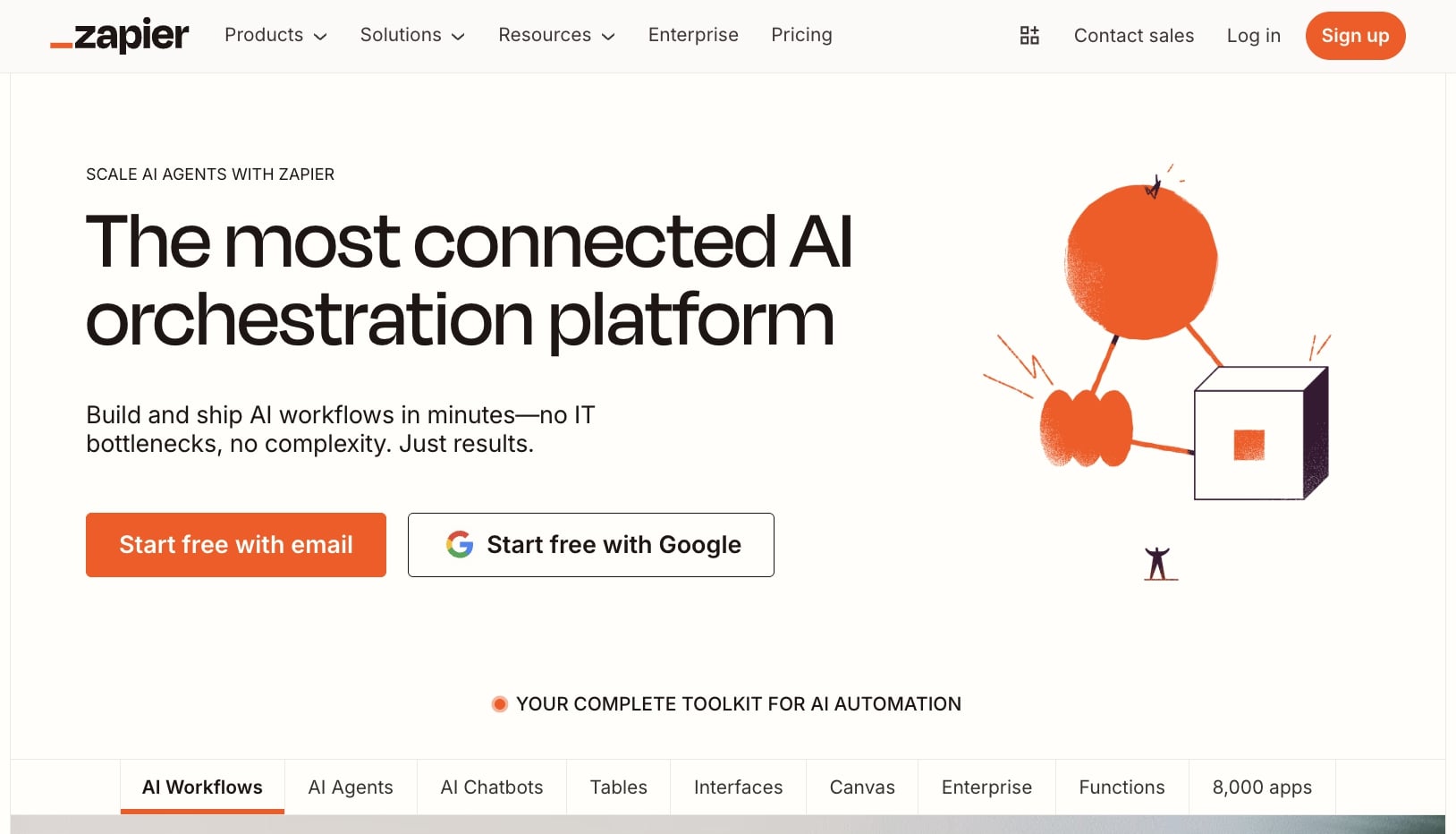
- Best for: Connecting apps together with simple if-this-then-that automations
- What I like: Massive library of integrations and solid reliability
- Pricing: Free plan available, paid plans start at $29.99/month
Zapier is one of the OG platforms when it comes to marketing automation. The tool works by acting as a connector between your apps.
For example, I use Webflow for my media website, Marketer Milk. The site showcases top marketing news and guides each weekday that are curated by users. When someone submits a link, it may be selected to be featured on the website's homepage. And I've used Zapier to connect my Webflow website to Google Sheets. This way when somebody submits a link through my site, Zapier then sends that link to a Google Sheet. And within that Google Sheet I can approve or disapprove a link, and if I approve the link it sends a signal back to Zapier which then turns that link into a CMS draft in my Webflow website.
But this can work with pretty much any app, which is why Zapier has been so popular over the past decade. And now with AI coming into the picture, they also have a very similar workflow to Gumloop when it comes to creating AI automated workflows.
This is one of those marketing automation software that is tried and true and has been a pretty reliable tool that I've used throughout most of my marketing career.
Here's what I like about Zapier:
- Integrates with basically everything (6,000+ apps)
- Tons of pre-built templates to get you started quickly
- Super reliable for mission-critical workflows
- Great documentation and community support
- Simple interface that non-technical people can understand
Here are some improvements that could be made:
- Gets expensive fast when you scale
- UI feels dated compared to newer tools
- Limited native AI capabilities compared to AI-first platforms
- Can't handle very complex logic without workarounds
Zapier pricing
Here are Zapier’s pricing plans:
- Free: 100 tasks/month, 5 Zaps
- Pro: $29.99/month for 750 tasks/month
- Team: $103.50/month for 2,000 tasks/month, shared workspace
- Enterprise: Custom pricing
You can learn more about what each plan offers by going to their pricing page.
Zapier reviews
Here’s what real customers of Zapier rate the platform on third-party review sites:
- G2: 4.5 out of 5 star rating (from +1,393 user reviews)
- Capterra: 4.7 out of 5 star rating (from +3,023 user reviews)
3. Clay

- Best for: GTM teams looking to automate prospecting
- What I like: Really powerful data enrichment and AI-powered personalization features
- Pricing: Free plan available, paid plans start at $149/month
Clay is a marketing automation platform designed for GTM (go-to-market) teams. This can be people that work in sales and marketing or in growth. In fact, Clay is famous for creating a new job called the GTM engineer.
The platform is like your own personal prospect researcher so you can find the right contacts for your outreach efforts. If you're working in growth, this is a great way to build up a list that you can then either send to your sales department or you can set up with an email automation platform to send out personalized emails.
The platform can also help you draft personalized messaging so you can reach out to each lead with a custom email.
If you're an agency or any sort of company that has a longer sales cycle because the deals are larger, then Clay is definitely a tool to look into.
Here's what I like about Clay:
- Combines 75+ data providers in one platform
- AI-powered research that actually finds useful insights
- Can build incredibly detailed prospect lists
- Great for account-based marketing campaigns
- Powerful spreadsheet-like interface for data manipulation
Here are some improvements that could be made:
- Steep learning curve for non-technical users
- Can get pricey when you need lots of credits
- Primarily focused on B2B use cases
- Takes time to master all the features
If you're looking for something a bit more simple to understand, it might be worth looking into an alternative.
Clay pricing
Here are Clay's pricing plans:
- Free: 100 credits/month, limited features
- Starter: $149/month for 2,000 credits/month
- Explorer: $349/month for 10,000 credits/month
- Pro: $800/month for 50,000 credits/month
- Enterprise: Custom pricing
You can learn more about what each plan offers by going to their pricing page.
Clay reviews
Here's what real customers of Clay rate the platform on third-party review sites:
- G2: 4.8 out of 5 star rating (from +162 user reviews)
- Product Hunt: 4.9 out of 5 star rating (from +101 user reviews)
4. Attio
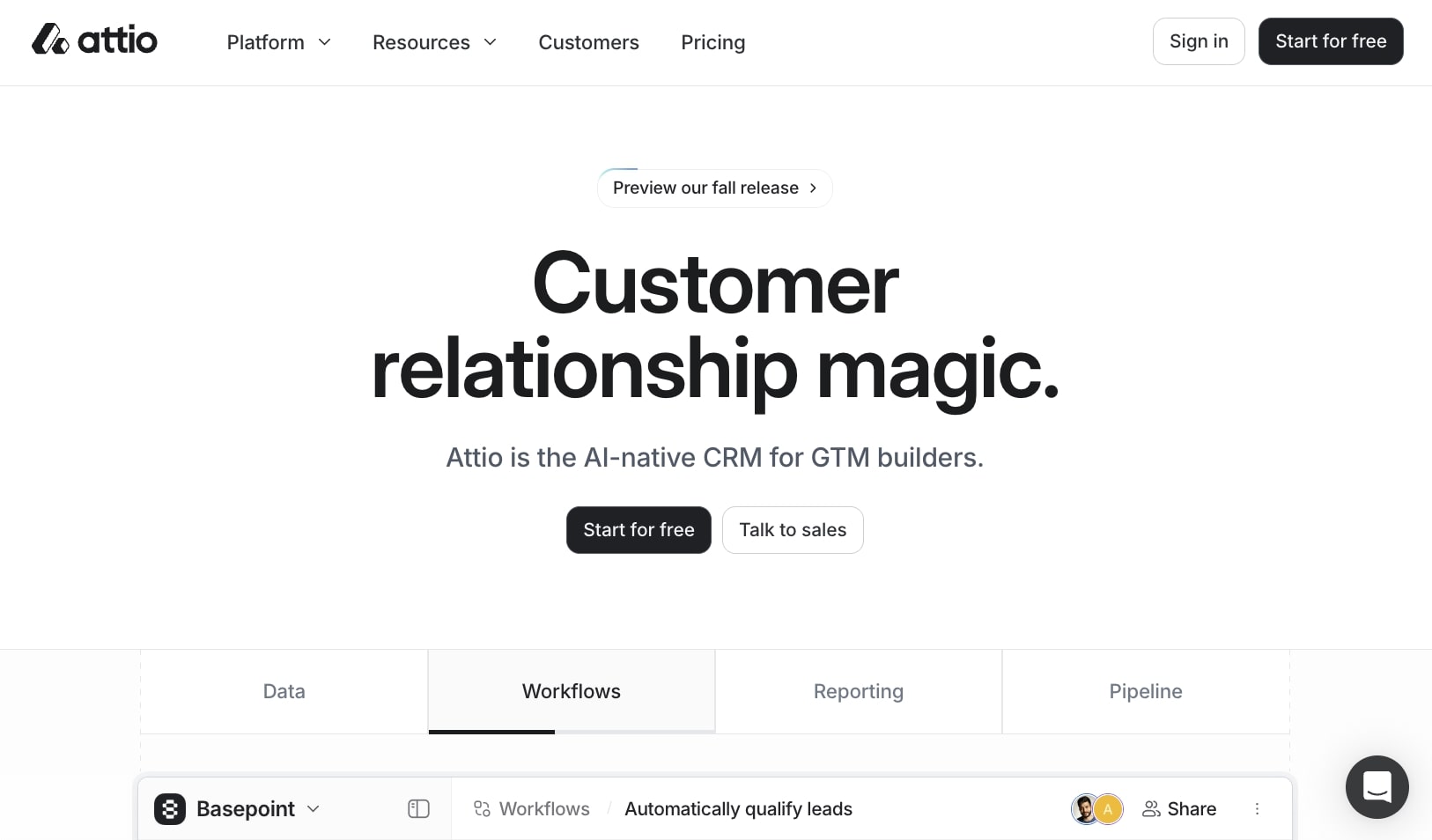
- Best for: Modern startups looking for a flexible CRM with built-in automation
- What I like: Clean interface that actually makes CRM enjoyable to use
- Pricing: Free plan available, paid plans start at $36/month
Attio is a CRM that has grown quite fast in the past year. In fact, it's one of the CRMs I see my friends talking about the most, so I decided to include it in this list.
What makes this platform great when it comes to marketing automation is that it helps you automate different aspects of your go-to-market workflows. For example, if you're a product-led growth company, you can get full context on users across your entire organization at every stage of the customer journey. And you can combine this with your product and CRM data.
And if you're a sales-led company, you can automate every aspect of your CRM to run with your sales processes. The platform also integrates with a ton of different tools that you may already be using in your entire tech stack.
For example, you can integrate it with analytics platforms like Segment, you can integrate it with Zapier, you can integrate it with Customer.io (another tool we'll get to soon), and you can even integrate it with project management tools like Google Drive or Linear. You can check out all the integrations here.
Here's what I like about Attio:
- Super clean UI/UX
- Flexible integrations with different data sources
- Native automation features built right into the CRM
- Real-time collaboration features for teams
- Great for both product-led and sales-led companies
Here are some improvements that could be made:
- Limited reporting capabilities compared to HubSpot or Salesforce
- Smaller ecosystem of integrations (but growing fast)
- Best suited for smaller to mid-size teams
Attio pricing
Here are Attio's pricing plans:
- Free: Up to 3 users, basic features
- Plus: $36/user/month, unlimited seats, up to 15
- Pro: $86/user/month, advanced automations, up to 100 reports
- Enterprise: Custom pricing
You can learn more about what each plan offers by going to their pricing page.
Attio reviews
Here's what real customers of Attio rate the platform on third-party review sites:
- G2: 4.8 out of 5 star rating (from +22 user reviews)
- Capterra: 4.3 out of 5 star rating (from +6 user reviews)
5. HubSpot
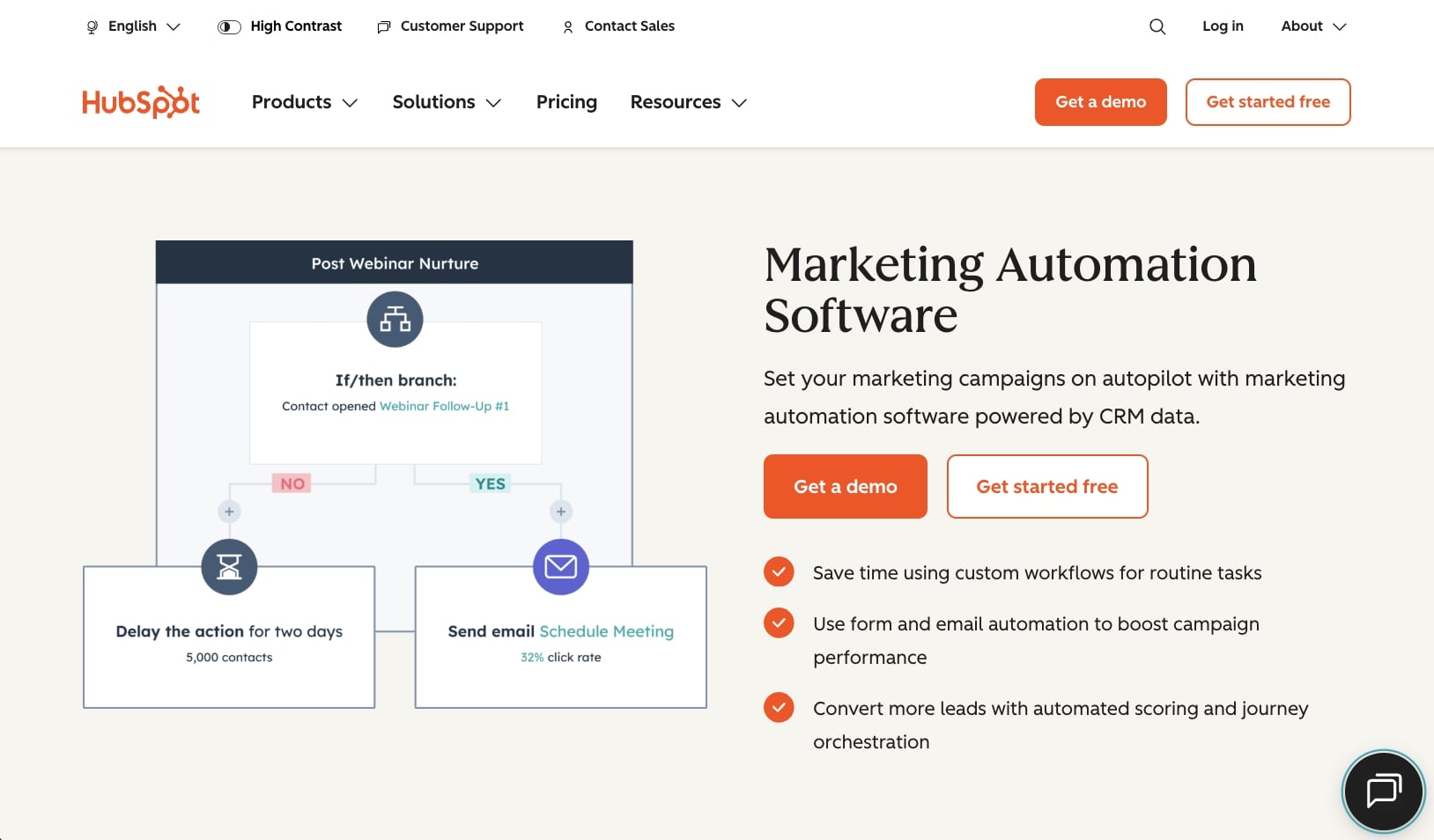
- Best for: Companies wanting an all-in-one marketing, sales, and service platform
- What I like: Everything lives in one place with deep native integrations
- Pricing: Has some free features, then starts at $15 per seat/month
If you've just Googled the word “marketing," I'm pretty sure you've come across HubSpot. HubSpot is the first real marketing automation platform that acts as a CRM for your entire marketing organization.
The platform can be overwhelming because it does do a lot of things, but when it comes specifically to marketing automation it has a couple of cool features. With HubSpot you can automate your lead generation using email pop-ups on your website and different forms. You can build really powerful automated workflows like when a contact is added through a form to create a delay which then after that sends them an email follow-up, and you can just automate your entire customer journey.
It's a bit similar to Attio in some aspects but it also brings in the legacy CRM functionality of a platform like Salesforce.
It's great because if you use HubSpot you have a lot of customer data, and adding on AI features to your first-party data is I think the best way when it comes to marketing as a use case to leverage AI. You can also use HubSpot for other things like creating landing pages, doing lead scoring and nurturing, and it's just an overall broad marketing platform.
Here's what I like about HubSpot:
- True all-in-one platform for marketing, sales, and service
- Powerful workflow automation builder
- Extensive educational resources and certifications
- Deep analytics and reporting capabilities
Here are some improvements that could be made:
- It’s pricey, might be hard for early stage startups to use
- Overwhelming number of features for small teams
- Some advanced features locked behind higher tiers
- Can feel bloated if you only need specific functionality
HubSpot pricing Here are HubSpot's pricing plans:
- Free: Basic CRM features, limited marketing tools
- Marketing Hub Starter: $25/month/seat for 1,000 marketing contacts
- Starter Customer Platform: $15/month/seat with extra sales features
- Marketing Hub Professional: $890/month for 2,000 marketing contacts (includes 3 seats)
You can learn more about what each plan offers by going to their pricing page.
HubSpot reviews
Here's what real customers of HubSpot rate the platform on third-party review sites:
- G2: 4.5 out of 5 star rating (from +13,777 user reviews)
- Capterra: 4.5 out of 5 star rating (from +4,422 user reviews)
6. Roadway AI
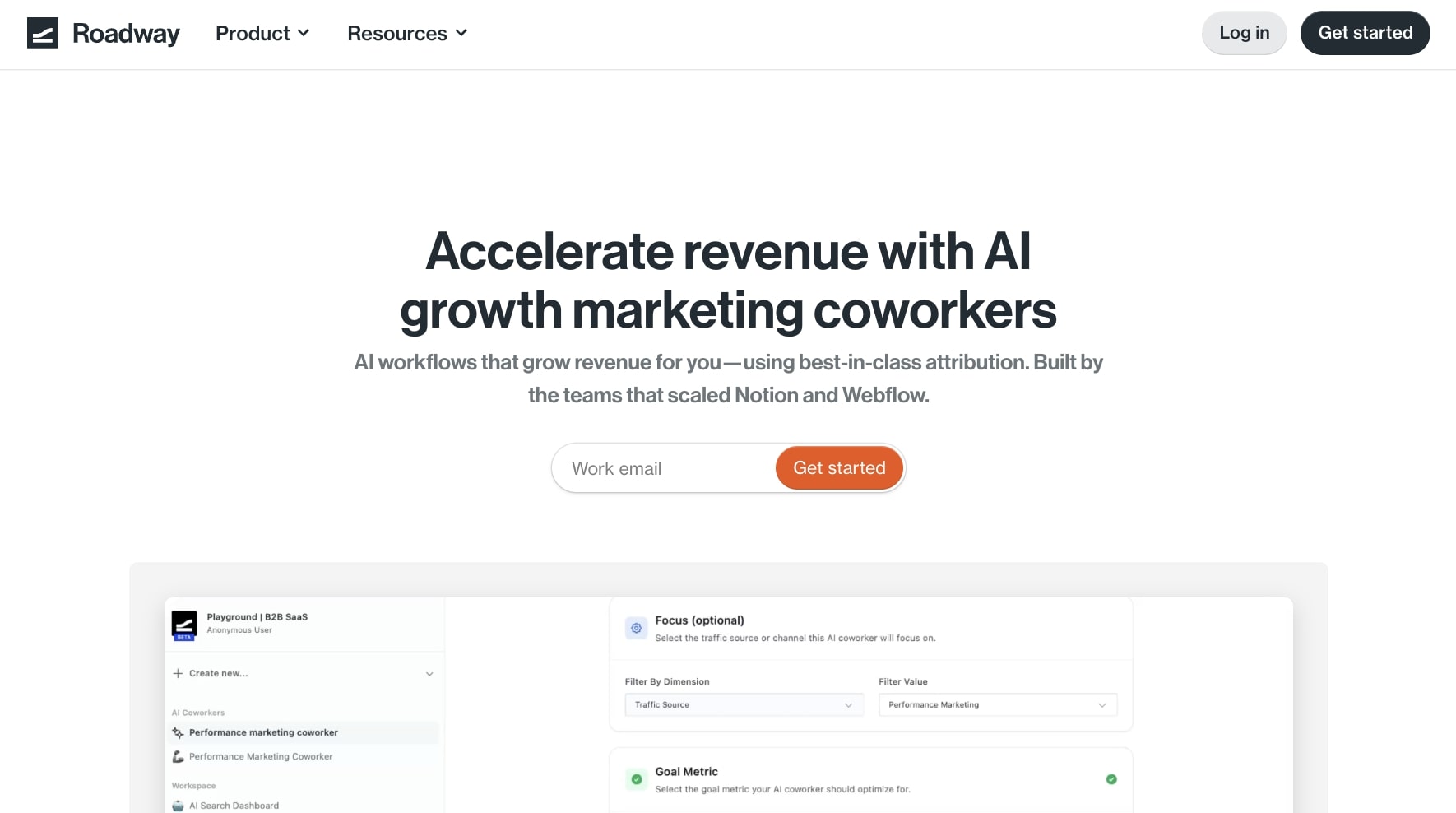
- Best for: Growth marketing teams that need marketing attribution
- What I like: Makes attribution actually understandable
- Pricing: Contact sales
Roadway AI is a newer platform designed for growth marketing teams. It's an AI analytics platform that integrates with all of your existing analytics tools and creates this AI layer that can act as your growth marketing coworker.
Marketing attribution is one of those things that's really complex, but Roadway makes it simple by showing you exactly where your website visitors are coming from but then also how they're interacting with your products and services.
For example, you can use Roadway to figure out if that latest influencer marketing campaign you did was worth it and how many paying customers it brought in. You can tell which pages on your site have brought in what types of customers through SEO. You can ask it to give you reports on the status of your marketing channels and how they're driving revenue. And overall just a ton of different insights when it comes to analytics and attribution.
Here's what I like about Roadway AI:
- Natural language queries to get analytics insights
- Connects all your marketing data sources in one place
- AI that actually understands marketing metrics
- Automated reporting that saves hours each week
- Clear attribution modeling without complex setup
Here are some improvements that could be made:
- Still a newer tool, so features are being added regularly
- Requires solid data infrastructure to work best
- Limited to analytics (not a full automation platform)
- Higher price point for smaller teams
You’ll need to reach out to the Roadway team to get a quote on pricing.
And because it is a newer tool, there aren’t that many public reviews. However, teams at companies like Clay, Notion, Reforge, and many more modern startups use them.
7. Customer.io

- Best for: Email marketing and customer lifecycle automation
- What I like: You can trigger emails based on real user behavior in your app
- Pricing: Starts at $100 per month
Customer.io is an email marketing and automation platform that lets you create personalized customer journeys across your marketing channels. I know "AI-powered customer engagement platform" sounds like marketing speak, so let me break it down.
Customer.io helps you create emails that get sent when people interact with your product. If you have ever signed up for a software product online, there's a good chance you immediately received an email from the CEO or some onboarding content. That was most likely sent with either Customer.io or a platform very similar to it.
What makes it useful is that you can automate different email flows to trigger based on specific customer journeys. For example, one type of customer using a specific feature might receive a certain sequence of emails compared to another user who took a different path through your product. This is customer lifecycle marketing in action.
I have worked with a bunch of companies that use Customer.io, especially SaaS companies, so I know it's a trusted platform. The behavioral targeting is pretty sophisticated compared to basic email tools like Mailchimp.
Here's what I like about Customer.io:
- Integrates directly with your product data, so you can trigger emails based on actual usage
- Great for onboarding sequences and retention campaigns
- Visual workflow builder that makes sense for both marketers and product people
- Good deliverability rates and good analytics
Here are some improvements that could be made:
- Can get expensive quickly as your user base grows
- Takes some setup time to get the behavioral triggers right
- Learning curve is steeper than simpler email tools
Customer.io pricing
Here are Customer.io's pricing plans:
- Essential: Starts at $100/month for 5,000 contacts
- Premium: Starts at $1,000/month (billed yearly) for custom contacts
- Enterprise: Custom pricing for larger volumes
You can learn more about what each plan offers by going to their pricing page.
Customer.io reviews
Here's what real customers of Customer.io rate the platform on third-party review sites:
- G2: 4.4 out of 5 star rating (from +576 user reviews)
- Capterra: 4.7 out of 5 star rating (from +86 user reviews)
8. Loops
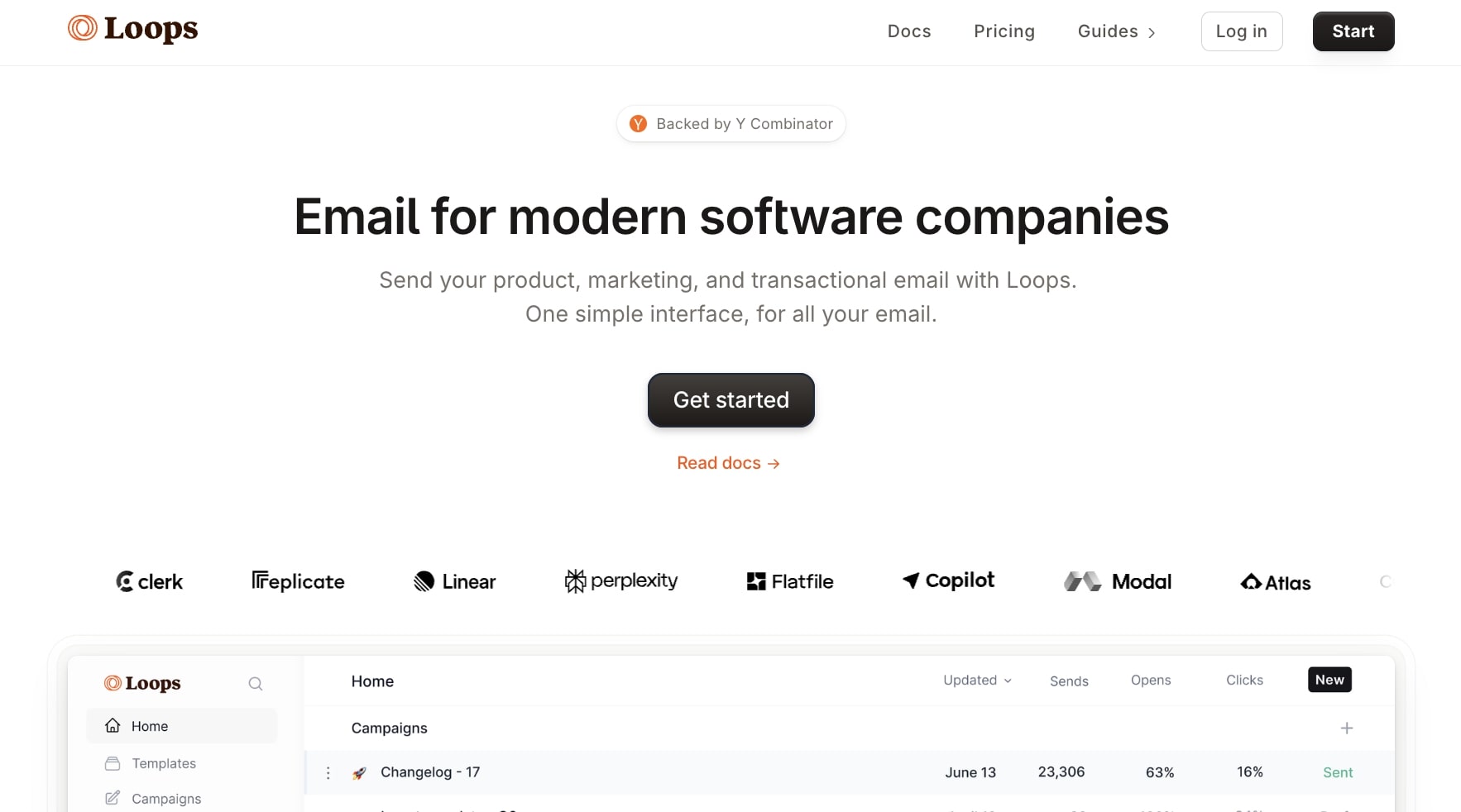
- Best for: SaaS startups that need product marketing emails
- What I like: Super clean and focused on the right features (no extra nonsense)
- Pricing: Free, then $49 per month
Loops is a modern email software for SaaS companies. It's very similar to Customer.io, but it's a bit more bare bones. And I don't mean that to say that it's less feature-rich. In fact, I believe that Loops is very much focused on software companies and it only gives you the essential features of what you need, which I think makes it actually a very easy platform to use.
There's just this element of simplicity that I love about Loops, and if you're a software company, I can't recommend checking this platform out to automate your product emails as well as your marketing emails.
Many of my clients through my content marketing agency actually use Loops for their product emails, and in fact, Gumloop (the website you're reading on) also uses Loops. It's a really great product, and if you run a software startup, I highly recommend checking it out.
Here's what I like about Loops:
- Clean, modern interface that doesn't overwhelm you with features
- Built specifically for SaaS companies and their email needs
- Easy setup for both product and marketing emails
- Great deliverability rates and responsive customer support
Here are some improvements that could be made:
- Limited advanced automation features compared to Customer.io
- Smaller integration ecosystem than more established platforms
- May not scale well for very large enterprise companies
- Fewer template options and design customization
Loops pricing
Here are Loops' pricing plans:
- Free: Up to 1,000 contacts
- Paid: Starts at $49/month for up to 5,000 contacts, then scales up
Loops’ pricing is a sliding scale that changes usually every 5K contacts. For example, 100,000 contacts will run you $399 per month.
You can learn more about what each plan offers by going to their pricing page.
Loops reviews
Here's what real customers of Loops rate the platform on third-party review sites:
- Product Hunt: 4.9 out of 5 star rating (from +137 user reviews)
9. beehiiv
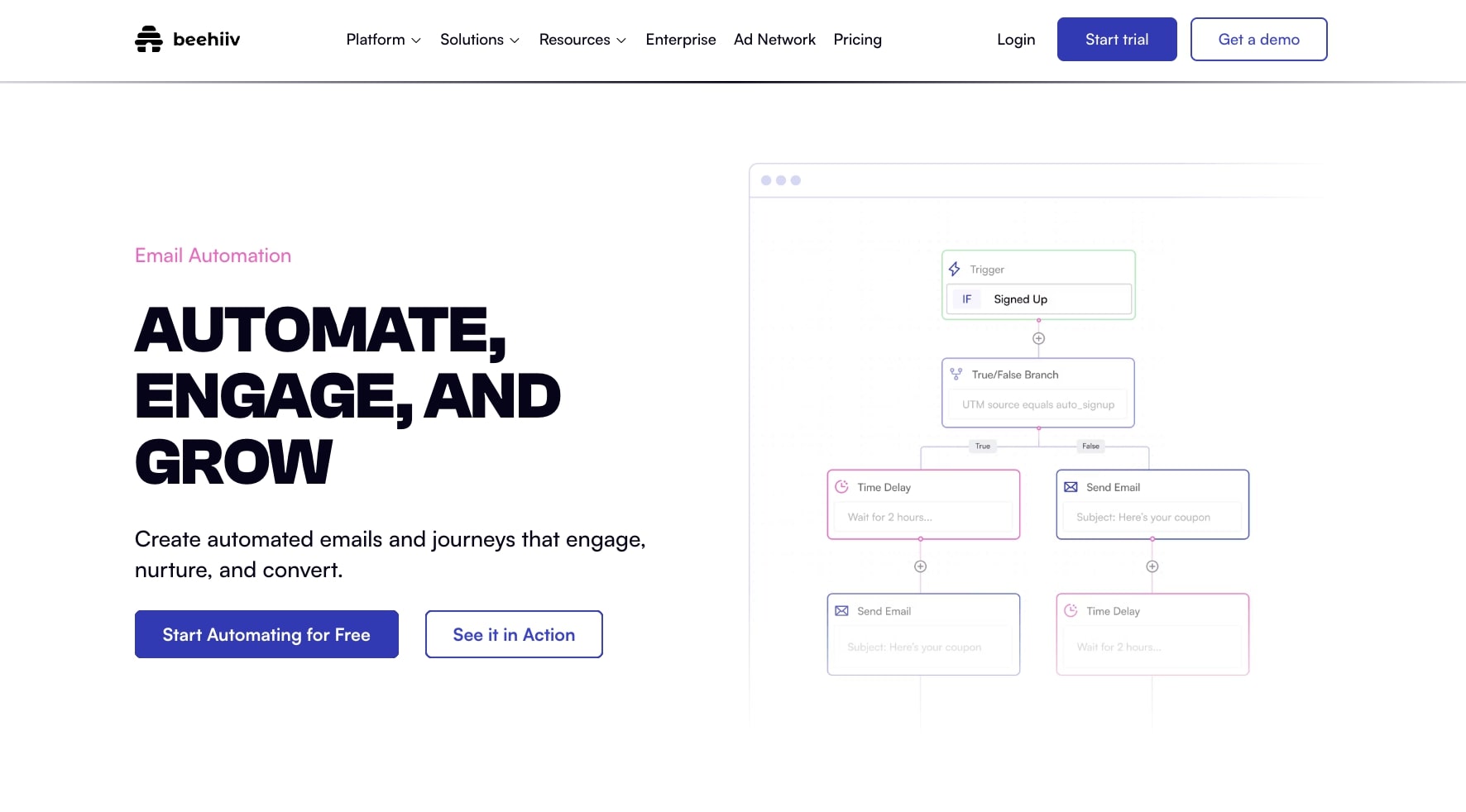
- Best for: Email newsletters and marketing automation for content creators
- What I like: Built specifically for newsletter creators with powerful automation features built in
- Pricing: Starts free for up to 2,500 subscribers, then begins at $39/month
beehiiv is an email marketing and newsletter platform. At first glance, you might not think it has anything to do with marketing automation, but beehiiv actually has a ton of automation features built in.
If you send any sort of marketing or newsletter-type emails, then you definitely want to check out beehiiv, as I believe it's one of the best email newsletter platforms.
You can segment your list and create automations similar to Loops or Customer.io that get sent based on certain triggers that you set. What makes beehiiv different than the other two email platforms we just went over is that beehiiv is focused mostly on content creation. So you want to use this platform if you're trying to nurture an email list or even build an email list, as they have subscribe opt-in forms that you can embed onto your website.
Tools like Loops or Customer.io are more focused on the product email side of things, although you can use them for marketing emails as well. But beehiiv is focused mostly on newsletters and marketing emails, so if that's the use case that's more important to you, I recommend you check out beehiiv.
Here's what I like about beehiiv:
- Built specifically for newsletter creators with automation features
- Great analytics and subscriber growth tools
- Easy-to-use editor with beautiful newsletter templates
- Monetization features like paid subscriptions and referral programs
Here are some improvements that could be made:
- Less sophisticated behavioral triggers compared to Customer.io
- Not ideal for complex product email workflows
- Newer platform with fewer third-party integrations
beehiiv pricing
Here are beehiiv's pricing plans:
- Launch: Free for up to 2,500 subscribers
- Scale: Starts at $49/month for up to 1,000 subscribers
- Max: Starts at $109/month for up to 1,000 subscribers
- Enterprise: Custom pricing for larger subscriber limits
You can learn more about what each plan offers by going to their pricing page.
beehiiv reviews
Here's what real customers of beehiiv rate the platform on third-party review sites:
- G2: 4.6 out of 5 star rating (from +28 user reviews)
- Capterra: 4.4 out of 5 star rating (from +13 user reviews)
10. Klaviyo
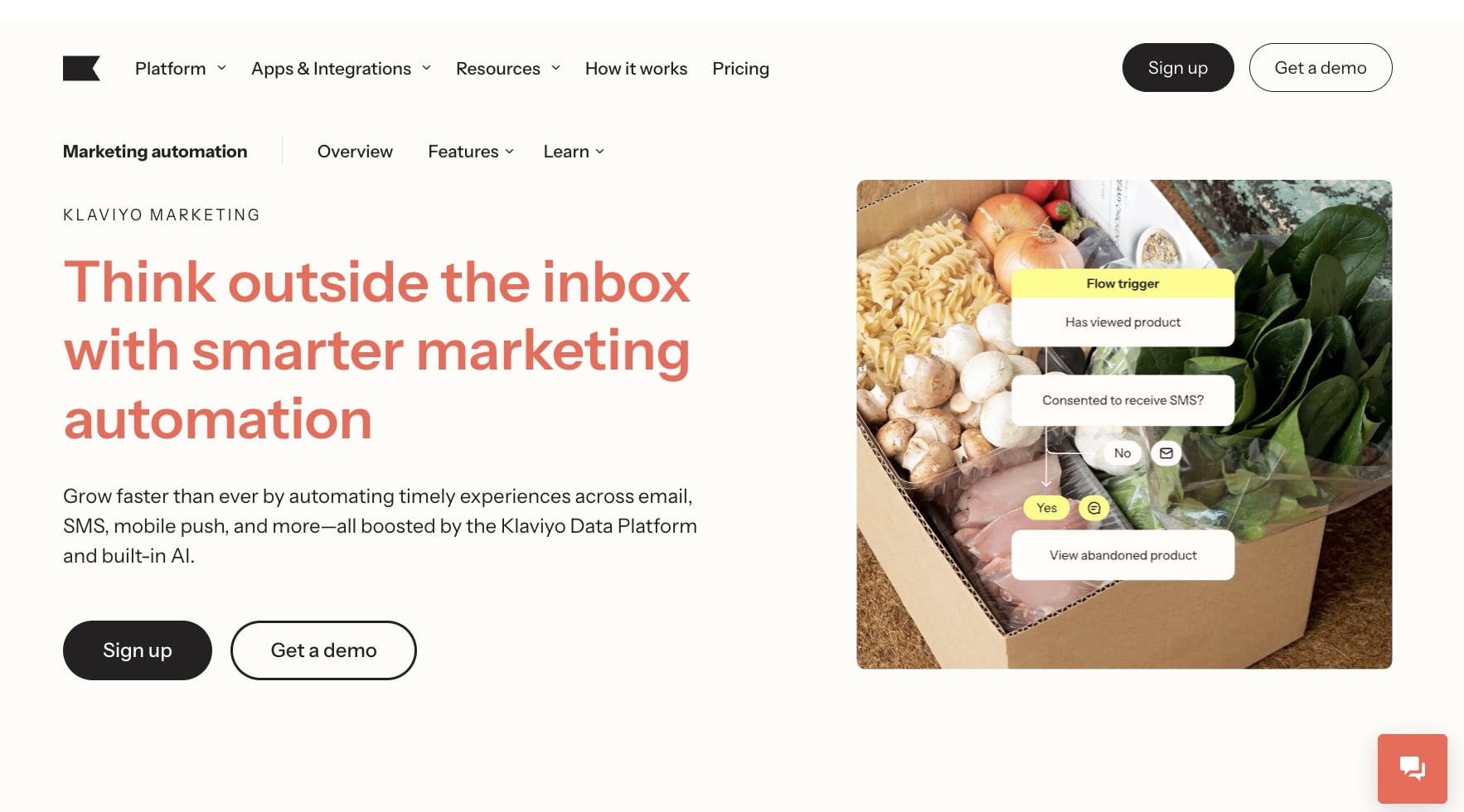
- Best for: Email and SMS automation for ecommerce brands
- What I like: Deep ecommerce integrations that actually understand shopping behavior and revenue impact
- Pricing: Starts free for up to 250 contacts, then starts at $45/month
Klaviyo is an email and SMS automation platform specifically designed for ecommerce brands. They started off mostly for Shopify websites, and that's how they really nailed down their niche. However, today they have expanded their feature set to help B2C ecommerce brands with their entire marketing strategy, from email marketing, SMS marketing, RCS marketing, WhatsApp marketing, and more.
The platform is designed to help you increase your revenue from email as a channel. So this could mean helping you with upsells, it could also be for doing abandoned cart emails, it can be for sending push notifications for certain deals or discounts during the holidays, or anything when it comes to creating an omnichannel marketing strategy.
If you have a Shopify or just ecommerce website in general and you're looking to streamline all of your email campaigns, then Klaviyo is a tool you need to check out.
Here's what I like about Klaviyo:
- Deep ecommerce integrations that track actual revenue from campaigns
- Powerful segmentation based on purchase behavior and customer lifetime value
- Pre-built automation flows for abandoned carts, post-purchase, and win-back campaigns
- SMS and email in one platform with unified customer profiles
Here are some improvements that could be made:
- Gets expensive quickly as your contact list grows
- Can be overwhelming for non-ecommerce businesses
- Learning curve is steep for beginners
- Limited functionality outside of ecommerce use cases
Klaviyo pricing
Here are Klaviyo's pricing plans:
- Free: Up to 250 active profiles, 500 monthly email sends, and 150 SMS/MMS credits
- Email: Starting at $45/month for up to 1,500 active profiles and 15,000 emails
- Email + SMS: Starting at $60/month for up to 1,500 active profiles, 15,000 emails, and 1,250 SMS/MMS credits
- Enterprise: Custom pricing for larger volumes and advanced features
You can learn more about what each plan offers by going to their pricing page.
Klaviyo reviews
Here's what real customers of Klaviyo rate the platform on third-party review sites:
- G2: 4.6 out of 5 star rating (from +1,104 user reviews)
- Capterra: 4.6 out of 5 star rating (from +503 user reviews)
What is the future of marketing automation?
Marketing automation is about to grow rapidly in the second half of the 2020s. As AI models and tools continue to evolve into 2026, 2027, 2028, and beyond, we'll see a new wave of innovation both in terms of the tools we use and how we approach marketing processes and strategies.
According to a study by Backlinko, currently the marketing automation industry revenue is just over $8 billion a year. However, by 2030 it is projected to rise to just under $14 billion per year.
This means we're going to see an entirely new wave of not only new marketing automation platforms and tools, but also how people approach digital marketing in general.
Sure, there will be tools that can help you automate repetitive tasks, do your lead nurturing, create reporting dashboards, A/B test, optimize conversion rates on your behalf, and all that jazz.
But what's going to really matter more than simply the best marketing automation software out there is the type of marketer that's going to be using them. As the barrier to entry for launching software and products keeps going down, knowing how to think strategically about marketing and distribution is going to be even more important.
You need to understand the business needs that people have, know how to do marketing for different audience segments, understand how to create user-friendly customer experiences, and really nail down the emotional side of marketing psychology.
If you're great at those skills, then using a marketing automation tool to help you with your marketing tasks is how you're going to get the most out of your marketing efforts. Gain the right knowledge of first principles marketing and combine it with the scalable aspects of AI tools, and you're going to become a top 1% marketer.
The future of marketing automation is bright. I'll see you at the top.
Read related articles
Check out more articles on the Gumloop blog.
Create automations
you're proud of
Start automating for free in 30 seconds — then scale your
superhuman capabilities without limits.


















